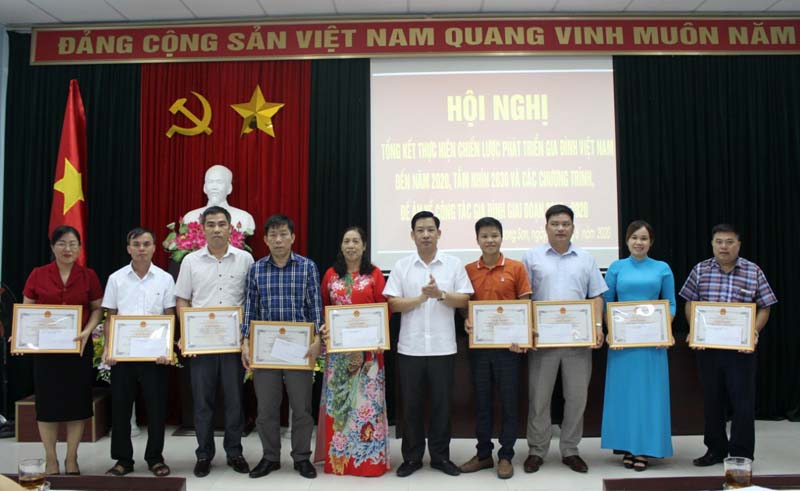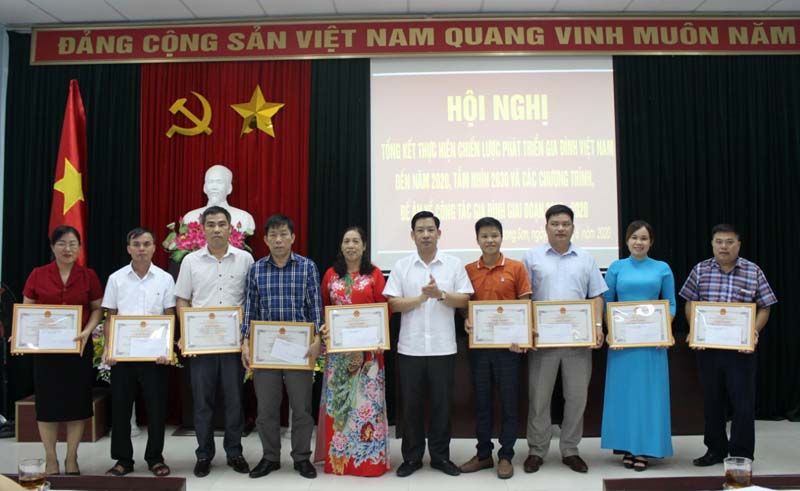
(HBO) – Vietnamese culture regarding behaviours among members in family has been a precious traditional value, which contributes to forming and nurturing each member’s personality, helping each member, family as well as the whole society become better.
 Leaders of the
People’s Committee of Luong Son district present certificates of merit to
collectives with outstanding achievements in implementing the strategy on developing
Vietnamese families to 2020 with a vision to 2030.
Leaders of the
People’s Committee of Luong Son district present certificates of merit to
collectives with outstanding achievements in implementing the strategy on developing
Vietnamese families to 2020 with a vision to 2030.
However, the tradition has been changing in both positive
and negative directions. The modern society, along with the strong growth of
different economic sectors, has impacted family life greatly.
Defining family building in the context of national
industrialization and modernization as an important task of the locality, the
provincial People’s Committee of Hoa Binh has directed local departments,
sectors and organizations as well as districts and city to focus on
implementing Directive 49-CT/TW issued on February 21, 2005 by the Party
Central Committee’s Secretariat on family building in the industrialization and
modernization period, the Notice on Conclusion No.26-TB/TW as well as the
movement on promote solidarity in building cultural life with specific actions.
Localities have launched and encouraged families to take
part in the movement to develop cultural families, while multiplying the models
of families of wealth, equality, progress and happiness as well as models of
families with outstanding achievements in economic development, academic
achievements, and families with harmony among different generations.
The Family Day (June 28) in 2020, which is themed
"maintaining and promoting the sound behaving culture in families,” along with
the national action month on domestic prevention and fight, provided a good
chance to highlight traditional cultural values related to families in Vietnam.
This is also an opportunity for family members to convey love to each other,
and for the community to pay attention to children and orphans, while couples increase
their understanding on family values, thus overcoming ups and downs to maintain
happy families./.
With an increasingly vibrant and widespread emulation movement aimed at building cultured residential areas and cultured families, Yen Thuy District has been making steady progress toward improving both the material and spiritual well-being of its people, while fostering a civilized, prosperous, beautiful, and progressive community.
Once lacking recreational spaces and community facilities, Residential Group 2 in Quynh Lam Ward (Hoa Binh City) has recently received attention for the construction of a new, spacious, and fully equipped cultural house. The project followed the model of state support combined with public contributions in both labor and funding.
The "All people unite to build cultural life" movement, which has been effectively integrated with Kim Boi district’s socio-economic development goals, is fostering a lively spirit of emulation across local residential areas, hamlets, villages, public agencies, and enterprises. In addition, through the initiative, traditional cultural values are being preserved and promoted, while community solidarity and mutual support in poverty reduction and economic development are being strengthened.
A working delegation of the Hoa Binh provincial People’s Committee led by its Permanent Vice Chairman Nguyen Van Toan on June 11 inspected the progress of a project to build the Mo Muong Cultural Heritage Conservation Space linked to tourism services in Hop Phong commune, Cao Phong district.
Born and growing in the heroic land of Muong Dong, Dinh Thi Kieu Dung, a resident in Bo town of Kim Boi district, in her childhood was nurtured by the sweet lullabies of her grandmother and mother. These melodies deeply imprinted on her soul, becoming an inseparable part of her love for her ethnic group's culture. For over 20 years, this love for her hometown has driven Dung to research, collect, and pass down the cultural values of the Muong people to future generations.
In the final days of May, the Ethnic Art Troupe of Hoa Binh Province organized performances to serve the people in remote, mountainous, and particularly disadvantaged areas within the province. These were not just ordinary artistic shows, but they were the meaningful journeys aimed at spreading cultural values, enhancing the spiritual life of the people and contributing to the preservation of ethnic minority cultural identities.



 Leaders of the
People’s Committee of Luong Son district present certificates of merit to
collectives with outstanding achievements in implementing the strategy on developing
Vietnamese families to 2020 with a vision to 2030.
Leaders of the
People’s Committee of Luong Son district present certificates of merit to
collectives with outstanding achievements in implementing the strategy on developing
Vietnamese families to 2020 with a vision to 2030.